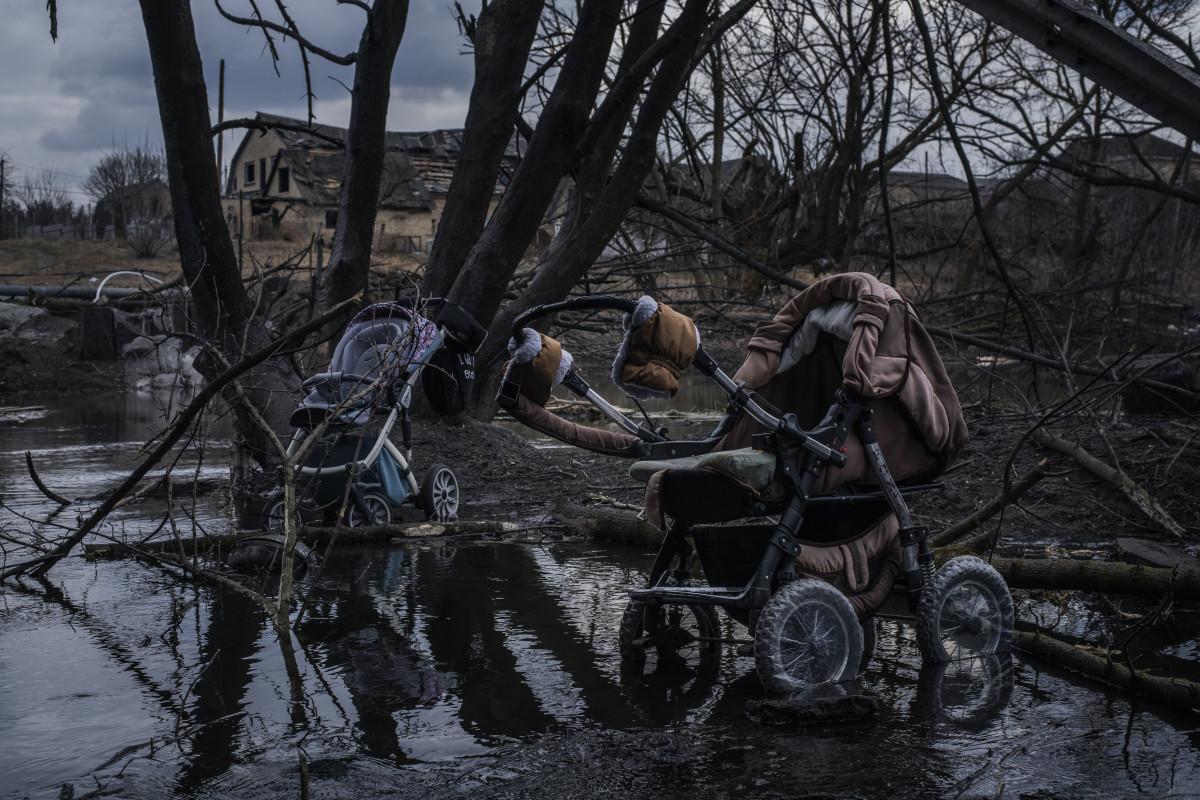Even war has rules, and in Ukraine, they are being grossly violated
Published: Mar 21, 2022 Reading time: 5 minutes Share: Share an articleViolations of international humanitarian law prevent humanitarian aid from reaching desperate people across Ukraine.

Since the invasion of Ukraine, People in Need has organized regular deliveries of humanitarian aid to the most affected parts of the country. So far, PIN has sent seven trains and thirteen trucks of material aid to Ukraine. The aid delivered by these trains has been further distributed throughout Ukraine, and more trains are on their way. However, this aid will not reach everywhere—many towns remain inaccessible. Worse still, humanitarian corridors are not functioning, escape routes are being shelled, and people have had to survive in damaged houses for weeks without food, water, heat or medical care.
Humanitarians and people on the ground are recording daily violations of international humanitarian law and committing of war crimes such as the shelling of civilians and civilian infrastructure. The UN's international court of justice (ICJ) in The Hague supports this view and has ordered Russia to halt its invasion of Ukraine, saying the court had not seen any evidence to support Russian’s justification for the war.
War does not permit lawlessness
As Russian forces advance, the number of accusations of war crimes, crimes against humanity, and violations of humanitarian law grows. The evidence of Russian war crimes is overwhelming, and it comes not only from sources in Ukraine. The war is being waged online. It is possible to watch live coverage of the shelling of civilian objects such as hospitals and schools; these are actions in direct contravention of the rules of warfare.
When war erupts, international conventions and fundamental human rights remain enforceable. Despite what some may believe, even war has rules, the violation of which makes the violator a criminal. People in Need has extensive experience of humanitarian work in warzones. In 30 years, PIN has set up humanitarian missions in Afghanistan, Syria, Iraq, in the Middle East; and in the Democratic Republic of Congo and Ethiopia, in Africa.
Donate to SOS Ukraine:
The protection of civilians is a top priority in wartime
One inviolable rule of war concerns avoiding attacking civilians or civilian sites. Such sites include medical facilities, educational institutions, and residential areas—these must not be attacked. According to the UN, between 24 February and 18 March, at least 847 civilians were killed— including 64 children. At least 1,399 people were injured—including 78 children. Due to difficulty in reaching some places, it has not been possible to conduct a full audit of casualties. Therefore, it is inevitable that the actual figures are much higher—the total number of civilians killed will run into the thousands.
Recent reports detail a multitude of Russian attacks on civilian targets. Attacked civilian infrastructure includes a kindergarten in the village of Okhtyrka, in the Sumy region; and a maternity hospital and theater —where hundreds of people were sheltering—in the trapped city of Mariupol. It is impossible to get aid to Mariupol, and local medical staff are treating wounded civilians in the basement of the city's destroyed hospital.
Residents have been unable to leave the occupied towns for several weeks
In early March, the Russian Federation and Ukraine agreed to create several safe escape routes from places occupied by the Russian army. However, reality is showing that Russian forces are not honoring their agreement. Additionally, despite several local ceasefires, the evacuation of civilians from Mariupol and the towns around Kyiv has been a failure. While some humanitarian corridors are partly successful, many others seem to exist only on paper and are ignored, with both warring parties accusing each other of intransigence.
People trying to flee the rubble of their homes have frequently come under direct fire and experience constant danger. Undermining or otherwise endangering agreed safe evacuation routes is a direct violation of the Geneva Conventions. Not only are non-combatants being prevented from leaving these places to find safety, but there is also no way of treating the wounded, providing medical care, transporting children and women, or providing such essentials as food and water.
People in Need is distributing drinking water by bottle and by truck to the areas in most need, many of which are in eastern Ukraine. These deliveries go to places where fighting has cut the pipes. PIN's humanitarian train bridge, which is linked to local Ukrainian distribution, supplies the most urgent material to areas throughout the entirety of Ukraine. However, we cannot reach towns where humanitarian corridors are unstable. Thus, people in these towns rely on dwindling local resources.
World court orders Russia to immediately halt invasion of Ukraine
In early March, the conflict in Ukraine was addressed by the Prosecutor of the International Court of Justice in The Hague, the highest court of the United Nations. The ICJ deemed Russia's invasion to be illegal. However, this institution has only minimal abilities to enforce its verdict. Moreover, Russia has veto power in the Security Council, thus further undermining any possible avenues of enforcement. The order for Russia to halt all its military operations in Ukraine can be seen as a partial victory that may lead to further ostracization and sanctions.
However, what this will mean in real terms for the Russian invasion of Ukraine is unclear, especially when we realize that Russia has ignored all previous efforts to end the war by the international community and individual states. The ICJ's ruling is unlikely to lead to any significant change.
